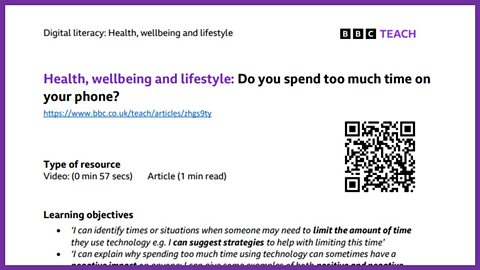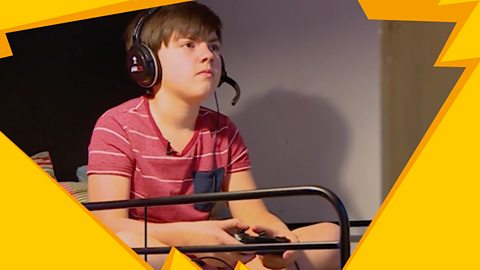Video summary
TV presenters and radio DJs talk about how they deal with spending too much time on screens/phones. They give tips including:
- Setting a time limit for looking at your phone
- Not looking at it just before bed
- Deleting social media apps for a day to refocus
- Using a real alarm clock rather than the phone alarm
- Making a phone rota
- Setting time limits to how much devices are used
Tips for cutting down your phone usage

First thing in the morning
We all know how important it is to start our day off right. A good breakfast, some nice music, a sunny walk to school? Though this sounds great, we often spend the first minutes of the day laying in bed and looking at our phones. So, why not use an actual old-school alarm clock? This way you won't pick up your device as soon as you wake up!
Set a daily limit
Sometimes all it takes is some boundaries. Think about a maximum amount of time you would like to spend on your phone in a day and try to stick to that. If you need help, most smartphones offer the option to set screen time limits.
You could also decide switch off some apps in the hour before you go to bed.
Delete that app for a day
Phones can get pretty distracting. And you know which apps have you scrolling for days. So, if you are busy with homework, or you feel the need for a digital detox, try deleting it for a little while.
Get it away from you
We all need some space. And sometimes, we need some space from our phones. If you feel like youβve been looking at the screen for too long today, just try keeping it out of sight for a bit.
Video: 0 min 57 secs
Article: 1min read
Learning objectives
(from the set out by the UK Council for Internet Safety)
βI can identify times or situations when someone may need to limit the amount of time they use technology e.g. I can suggest strategies to help with limiting this timeβ
βI can explain why spending too much time using technology can sometimes have a negative impact on anyone; I can give some examples of both positive and negative activities where it is easy to spend a lot of time engaged.β
Glossary
- Device: something made for a particular purpose, eg. a tablet computer, a laptop, or a phone
- Endlessly: seemingly has no limit
- Scrolling: moving text or graphics up, down or across on a screen
- Delete: to erase
- Focussed: to concentrate on
- Rota: a schedule
Topic introductions and starters
Before the video:
- Ask pupils to work out how much time each day they spend looking at a screen (this doesnβt need to be shared, itβs just for their own information).
After the video:
- Check understanding of any new vocabulary or specific terminology: e.g. device, endlessly, scrolling, swiping, delete, focussed, rota
- Work in pairs or small groups to make a list of all the things they do on screens β divide the list up into categories β e.g. positive/negative
- Watch the video again (either as a class or in smaller groups/pairs) and make notes β use pause/play/rewind to help with note taking
- Use the notes to write a list of the tips that are shared in the video β rank them in order of usefulness
- Take screenshots (printed or copied/pasted into software) of each person in the video and add a speech bubble with their suggestion.
Discussion Points
What is the problem with spending lots of time on screens/phones? Could you be at risk of missing out? Does spending a lot of time on screens take you away from engaging with whatβs going on in the present?
Why is it so hard to limit time spent on screen? Is it because games, social media and videos are addictive? Why is this?
Why do social media companies want us to spend more time on screen So we see more adverts? So we spend more money? So we give them more of our data?
What could we do instead of being on our screens? Play board games? Be physically active? Spend off-screen time with friends and family? Find ways to relax, such as reading books or being creative?
Fillers and fast finisher activities
- Make a βtop tipsβ poster or leaflet (using ICT publication tools if possible) to highlight the advice given in the video
- Add your own tips and advice on how to limit your screen time to the advice given in the video
- Write a list of the possible negative consequences of spending too much time on screens and phones β both physical and mental
- Write an acrostic poem about limiting screen time using the letters SCREENTIME as the first
Signposting potential homework activities
- Discuss screen time limits with family β ask older family members what they did before the internet and personal devices were so common and popular
- Write a screen time rota/timetable based on their own daily routines and habits, and share with family members
- Create your own video/presentation with your advice on limiting screen time
- Make a list of different offline things you could do instead of screen time β try some out and keep a diary of how you get on
For download/printing

More from: Health, wellbeing and lifestyle
Digital detox tips. video
Katie Thistleton gives advice on when and how to take a break from screens and social media

Feeling the need for a digital detox? quiz
A quiz that asks questions and helps people recognise when they need a break from screen time

Could you give up tech for a whole weekend? video
Tech loving student Ewan is challenged to give up tech for a whole weekend
